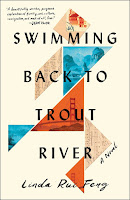I've been wanting to read a Taylor Jenkins Reid book for a while now and actually have several of her previous works on my shelf, it's just that I haven't had time to get to them yet (which I intend to at some point) -- so of course, I was excited when I was able to get my hands on an ARC of Reid's newest novel Malibu Rising (which is scheduled to release on June 1st). Reading the premise of the book, I originally thought this would be right up my alley, with a story revolving around the evolution of a family over several generations (I love family stories) against the backdrop of a setting (Southern California) and timeframe (1980s era) that I'm more than familiar with having myself grown up in Los Angeles in the 1980s. Based on these reasons, I thought I would be able to connect with the story at least somewhat – unfortunately, that did not turn out to be the case.
Before I go into what didn't work for me though, I do have to say that I actually didn't have much issue with the writing. In fact, given the unique structure of the story, the descriptive language, the vivid imagery, as well as the use of allusion and foreshadowing woven so seamlessly throughout the narrative, I have no doubt in Reid's abilities as a writer and a gifted storyteller. For me, the problems I had with this book had more to do with it perhaps being not the right book for me, and also going into this with certain expectations and being disappointed by the outcome.
In terms of the story, the first half of this book was actually pretty solid (even though, admittedly, I couldn't stand a few of the characters – but more on that later) and if the trajectory of the rest of the book had continued on in a similar vein, I'm sure this would've been a solid 4+ star read for me. But instead, the second half of the book — which started with the first hour of the party and covered the entire timeframe though to the end — unraveled to the point that I almost didn't want to bother finishing the book, except that I was already so close to the ending and didn't want to feel like I had wasted my time reading up to that point. Ironically, in the end, even after finishing the entire book, I still felt like I wasted my time because most of the Riva family's story arc (which had been so well developed in the first half and I had been looking forward to in the second half) got lost in the shuffle of the wild and crazy, over-the-top play-by-play of the party (which I honestly felt was wasted plot space and highly unnecessary). I mean, yes, I knew from the beginning that the party would be an important part of the plot and I was expecting a few pages, perhaps even a few chapters, to be dedicated to the party — what I wasn't expecting was for nearly every aspect of the party to be painstakingly detailed and drawn out over the course of 150+ pages. (Disclaimer: I didn't actually count the pages, but part 2 started around the 53% mark on my Kindle and with the book clocking in at 384 pages, I figured 150 is a close enough midway page count). I'm sorry, but there is only so much of "the rich and famous behaving badly" that I am able to stomach (especially when that "behavior" consists of getting drunk, having sex, doing drugs, destroying things, etc., then rinse and repeat on overdrive every 2 pages or so) before I feel like I want to vomit. Given how the party concluded in the end, I honestly wasn't sure what the point of including all those scenes was.
As for the characters, I honestly didn't like any of them (especially the parents, whose horrible decisions caused so much unnecessary pain and difficulty in their children's lives). Probably the only character that I felt a little bit of sympathy for was Nina…everyone else was downright annoying, frustrating, and, in the case of Mick Riva, a disgusting piece of trash! The second half of the book consisted of a ridiculous parade of characters that I found exhausting to read about — after awhile, I just ended up skipping pages because I figured I wasn't missing anything anyway…
Obviously, I didn't enjoy this book much and under normal circumstances, would've probably rated this way lower than I did — but I thought the first part was truly well done and the second part would've worked if not for the overload of irrelevant party scenes that overshadowed the main story line. Instead of being the powerful, moving story about love, loss, the bonds of family, resilience in the face of sacrifice, etc., that it could've (should've) been, this turned into a frustrating-to-read story about a rich and famous family whining about their messed up lives and their messed up relationships — a family that, by the end of the book, I could no longer bring myself to care about.
Received ARC from Ballantine Books via NetGalley.




